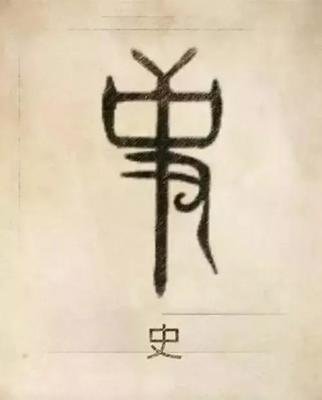The Shi(shǐ) surname is one of the oldest surnames in China, with origins deeply rooted in ancient legends, the evolution of official systems, and the blending of multiple ethnic cultures. It carries the important mission of Chinese civilization, from the creation of written characters to the recording of history.

Ⅰ、Origins of the Shi Surname
The origins of the Shi surname reflect the early integration of ethnic groups and the evolution of systems in Chinese civilization. Here are the main sources:
1. The Living Fossil of the Historian System
The oldest origin of the Shi surname can be traced back to Cangjie, a historian during the reign of the Yellow Emperor (also known as Shi Huangshi). Cangjie is credited with creating pictographic characters, replacing the earlier knot-tying method of recording events. He is revered as the "Ancestor of Writing," and his descendants adopted "Shi" (shǐ), meaning "historian," as their surname.
2. A Witness to Ethnic Integration
During the Sui and Tang dynasties, descendants of the Shi Kingdom (part of the "Nine Surnames of Zhaowu" in modern-day Uzbekistan) migrated to Central China and adopted "Shi" as their surname. Additionally, members of the Turkic Ashina clan, after submitting to the Tang Dynasty, also adopted the Shi surname.
3. A Product of Special Historical Events
During the Yuan Dynasty, some families changed their surname to Shi to avoid persecution. Similarly, during the Ming and Qing dynasties, ethnic minorities in southwestern China (such as the Bai and Tujia peoples) adopted the Shi surname as part of the "Tusi" reform policies.
Ⅱ、Historical Figures of the Shi Surname
1. Guardians of Ancient Civilization
Shi Yi (Western Zhou Dynasty): The first official historian to systematically record Chinese history, revered as one of the "Four Sages" alongside Jiang Ziya.
Shi Hao and Shi Miyuan (Southern Song Dynasty): Both served as prime ministers. Shi Hao played a key role in rehabilitating the reputation of the national hero Yue Fei, while Shi Miyuan held power for nearly two decades. Their family was renowned for producing "three prime ministers in one lineage."
Shi Tianze (Yuan Dynasty): A military strategist who rose to the position of prime minister, aiding the Yuan Dynasty in unifying China.
Shi Kefa (Late Ming Dynasty): A general who defended Yangzhou against the Qing army, symbolizing unwavering loyalty and national pride.
2. Pioneers of Modern Transformation
Shi Liangcai (Modern Era): A pioneering figure in Chinese journalism, known for revolutionizing the newspaper industry as the head of Shen Bao.
Shi Yuzhu (Contemporary): Founder of Giant Interactive Group, a key figure in the rise of China's private economy.
Shi Tiesheng (Contemporary): A renowned writer whose works, such as 《Me and the Temple of Heaven》, have touched millions of readers.
Ⅲ、Cultural Significance
1. Clan Identity System
Ancestral Hall Names: Names like "Jiankang Hall" and "Gaomi Hall" carry regional cultural memories.
Family Teachings: Values such as "recording history impartially" and "preferring integrity over compromise" are central to Shi family traditions.
2. Migration
Originating in Shaanxi, the Shi surname spread to Gansu during the Han Dynasty. During the Tang and Song dynasties, the family migrated south to Jiangsu and Zhejiang, forming the prominent "Liyang Shi Clan." Later, during the Ming and Qing dynasties, they moved to Yunnan, Guizhou, and northeastern China.
Ⅳ、Social Impact
1.Foundations of Ancient Civilization
The establishment of the historian system during the Western Zhou Dynasty laid the groundwork for Chinese historiography.
Shi You's creation of Jijuzhang contributed to the standardization of Chinese characters.
2.Contributions to Modern Transformation
Shi Liangcai's leadership in media reform helped shape China's public discourse.
3.Cultural Heritage
Contributions like Shi Zhou's work on Chinese characters and Shi Hao's efforts in cultural preservation have played a vital role in the continuity of Chinese civilization.
Conclusion
The Shi surname is like a living history of Chinese civilization, embodying the professional ethos of "recording history impartially" while witnessing the integration of multiple ethnic groups. From the creators of oracle bone script to innovators in the digital age, the Shi community has always played a unique role in the writing of history. Today, this ancient surname continues to write new chapters—statistics show that 2.3% of the global Shi population is engaged in cultural and media industries, continuing their mission to document the times.